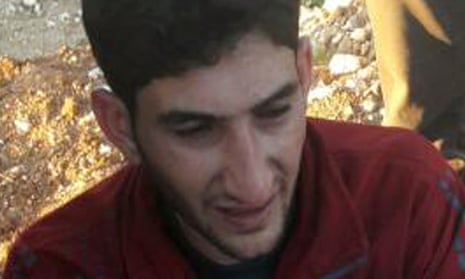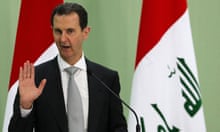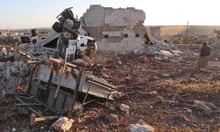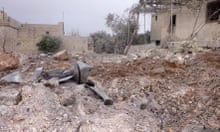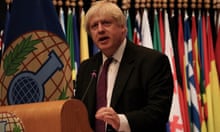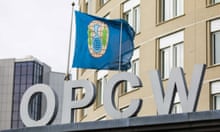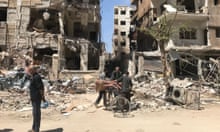In these dark days, the drive through Idlib province is a study in contrasts. Few places match its beauty in spring – green as far as the eye can see, olive and cherry trees in blossom, yellow and purple flowers alongside the verdant hues of the earth.
But look further into the distance, at the towns and villages that dot the countryside along the way to and from Khan Sheikhun, scene of the chemical attack on Tuesday that killed more than 80 people, and you will see columns of smoke rising in the sky.
Few journalists with western organisations have seen this landscape in the past three years. The threat of airstrikes and kidnappings, and the difficulty in obtaining permission to cross the border into Syria, have largely kept the world’s media away. But I went there on Thursday to document the aftermath of the brutal chemical attack that provoked President Donald Trump into launching 59 Tomahawk missiles in response.
No town has been spared the scars of war. The road to Khan Sheikhun is lined with ruined buildings and the rusted remains of destroyed tanks. A twisted hunk of metal is all that’s left of the gate of a checkpoint obliterated by a suicide bomb.
Then there is Khan Sheikhun itself. This is a silent place of mourning now, largely abandoned in the aftermath of the horrific sarin attack. No one knows for sure the exact death toll, because some of the dead were refugees from the neighbouring province of Hama who sought shelter here, and their relatives took them home for burial.
At the cemetery a child who had helped to bury his friends lingered beside the fresh tombstones. There is something sobering in counting them, in the knowledge that two of the children were buried alongside their mother. All these graves belonged to the same family. How does one grieve when the loss is so great?
In Abdul Hamid al-Yousef’s home, where mourners gathered to pay their condolences, there were no answers. More than 20 members of his family had died. The pain was visible on his face as he tried to stifle the tears, alternating between staring into the distance and confronting the reality in which he was living. A visitor sat by him, reminding him gently of the virtues of his patience. Muslims believe that on the day of judgment, all will have to cross the bridge of “Al-Sirat” passing above the fires of hell and leading to the gates of paradise. For parents who lose their children and persevere, the visitor reminded him, citing a saying by the prophet Muhammad, they will be flown across Al-Sirat by the winged spirits of their children. Abdul Hamid’s tears began flowing again.
“And their mother too? Ahmad and Aya will be there? And Hammoudi and Ammoura?” he said, referring to his two children and nephews who were killed.
Abdul Hamid and his brother Khaled had rushed out of their homes in the early hours of the morning to help the wounded once the extent of the atrocity was clear. His wife and children were at home and sought refuge in their basement, where the sarin seeped in and suffocated them. Khaled collapsed when he reached the hospital, fainting due to the exposure to the chemical agent. He lay in bed in the next room, his voice barely audible as he recounted the ordeal and fought back an emotional breakdown.
“So many were lying on the ground, white foam coming out of their mouths,” he said. “I took some of them to the clinic, and the civil defence were hosing them down with water and giving them oxygen. I fainted when I brought my brother, Yasser.
“I took him, I took my sisters, and five children in the car,” he said.
When he woke up, Khaled found himself in a hospital in the nearby town of Binnish. When he came back to Khan Sheikhun, he found his relatives laid side by side in the home.
His cousin, Alaa al-Yousef, was at home a short distance away at 6.30am when the bombs fell. A worker at the local clinic, he suspected a chemical attack when he found out that people were falling unconscious on the street. He doused his family with water, vinegar and soda drinks, and put them in a car to escape the carnage, but had to rush back when his wife began exhibiting symptoms of exposure to the toxins. That was when he saw his cousin Yasser, Abdul Hamid’s brother, who was dead. “I had to hug and kiss him, though I knew he had been contaminated by the chemical,” he said.
After his wife had been stabilised at the clinic, Alaa went back to the home where his cousin was being prepared for burial. But now eight other new corpses were there – his brother-in-law, another cousin, several nephews. And in the other room there were corpses of women from the family.
“I cannot describe to you in words how we all felt,” he said.
But there was more. They had all thought Abdul Hamid’s family were fine in the shelter. But when they went there, there were nine corpses, including his nine-month-old twins and his wife. He had a nervous breakdown, alternating between weeping and laughing. At the cemetery, he held his children close, refusing to part with them until he had consigned them to the ground. His photograph would go viral a few hours later on social media, and Trump would repeatedly cite the images of beautiful dead babies as a spur for taking action.
But in Khan Sheikhun, Abdul Hamid was preparing to part with his “twin souls”.
“He wouldn’t leave them, carrying them one in each arm,” Alaa said. “He told me, ‘take my photo with these angels’.”
